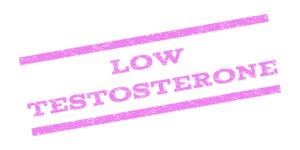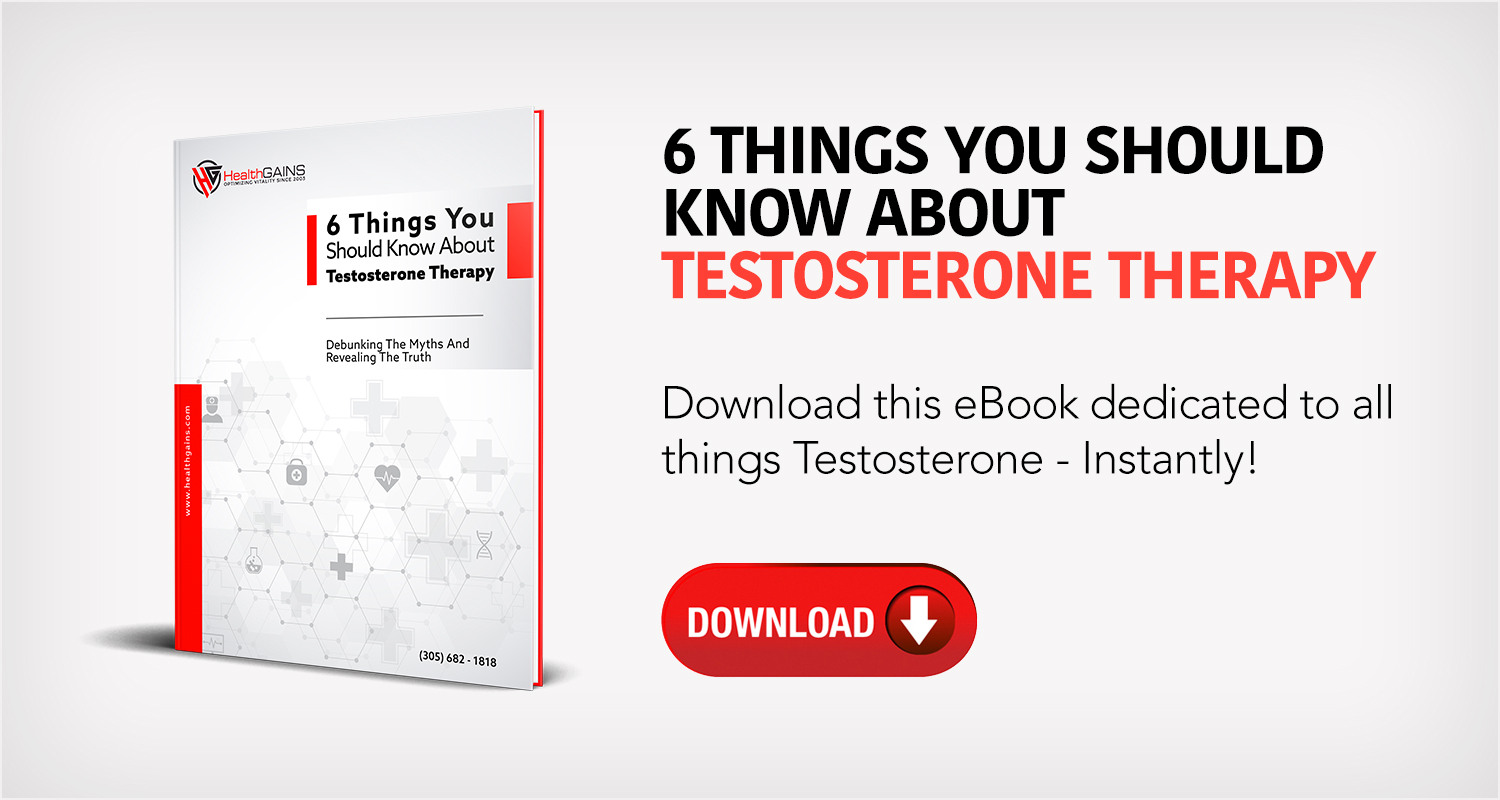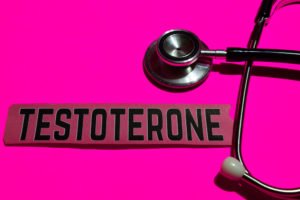
The main cause of low testosterone levels appears to be age-related. Age-related low testosterone occurs gradually over time. Beginning at around age 40, a man’s testosterone levels begin to fall 1% every year. When men reach their 50s and 60s, they begin to notice the signs and symptoms of the condition, but there is good news. Research has demonstrated that safe testosterone therapy improves the signs and symptoms of low testosterone.
Andropause is the common name for the time when male sex hormone levels begin to fall, and it results in several symptoms. Nearly 50% of men begin to have issues with obtaining an erection, approximately 40% of men begin to lose strength, around 35% of men begin to experience memory loss, about 15% of men begin to have issues with intimacy and about 6% of men are diagnosed with osteoporosis.
The Sex Hormones
The pituitary glands secrete follicle-stimulating hormone or FSH and luteinizing hormone or LH. These hormones regulate the activity of the testes. One job that the testes have is producing sperm cells, but the other job is to produce testosterone. The testes’ interstitial cells are the ones that secrete testosterone into the bloodstream, and it is stimulated by LH.
Normally, when your testosterone levels are low, the hypothalamus receives a signal to release the LH-releasing hormone. This causes the pituitary gland to release LH, and this causes the testes to secrete testosterone.
As you age, your body begins to produce less testosterone. During this time, the hypothalamus isn’t releasing as much LH-releasing hormone, so less testosterone is being secreted into your bloodstream. Because this occurs, the pituitary gland also cuts back on its activity and doesn’t produce as much LH. This whole process means that there is less testosterone in your body.
For a free consultation, call (305) 682-1818

Low Testosterone Causes
There may be a medical reason for your lower levels of testosterone, but there may also be reasons not related to your hormones. Some of these follow below:
Foods that Cause Low Testosterone
Soy
Edamame, soy milk, tofu and miso are known to lower your testosterone levels. Researchers studied 35 different men, and they learned that these men had lower levels of testosterone after drinking soy protein isolate for 54 days. In addition to that, we know that plants have high levels of phytoestrogens, and these phytoestrogens act as estrogen does in the body. So, they are altering your hormone levels and reducing your testosterone.
Since there have been some conflicting results in this area, more research is needed before we can definitively say that soy reduces testosterone.
Nuts
Nuts are good for you, but some studies suggest that they aren’t good for your testosterone levels. They contain high levels of polyunsaturated fatty acids, and some studies have demonstrated that this lowers your levels of testosterone. This is another area that needs more research.
Processed Foods
Processed foods include frozen meals and packaged snacks, and they have an incredible amount of trans fats. This isn’t good for your heart, but it also isn’t good for your testosterone levels. Studies have shown that if a man consumes a large amount of trans fats, his testosterone levels are 15% lower than those of subjects in the habit of consuming lower amounts of processed foods. This same group of men was also found to have a 37% lower sperm count.
Flaxseed
Some researchers performed studies on flaxseed, and they determined that it may lead to a reduction in testosterone. Flaxseed is known to contain “lignans,” and lignans bind to the testosterone in your body and flush it out. Flaxseed also contains high levels of omega-3 fatty acids, and this is believed to reduce your levels of testosterone as well.
Not surprisingly, current research isn’t sufficient to link flaxseed to lower levels of testosterone, so researchers are suggesting that they initiate more studies.
Licorice Root
Licorice root isn’t exactly a food. It is an ingredient that some people add to make their candies or beverages sweet. Several studies have shown that licorice root may be the reason that testosterone levels will gradually decrease. In a study that lasted for seven days, 25 men ate 7 grams of licorice root each day. After the week was over, testosterone levels dropped by 26%.
Mint
Research has also demonstrated that mint can lower your levels of testosterone. The two members of the mint family that have a particular impact on testosterone levels are spearmint and peppermint. The research demonstrating this to be the case focused on women and animals. More research studies are needed to show how mint affects men and their testosterone levels.
Dairy
If a man has low levels of testosterone, it would be a good idea for him to avoid dairy products. The reason may be because of the cow’s milk. A cow’s milk contains hormones, and hormones have been known to reduce a man’s testosterone levels. There is also the possibility that the cow received a diet of feed that contains soy, and soy increases the amount of estrogen in a cow’s milk.
Alcohol
Anyone with issues with drinking has one more reason to leave alcohol on the table. Current Drug Abuse Review published a study that reveals that if a man indulges in heavy drinking or regular drinking over a long period of time, it causes testosterone levels to drop. Interestingly, the results also showed that alcohol consumption results in higher testosterone levels in women.
Click to contact our specialist today
Does Vasectomy Cause Low Testosterone?
Some people wonder, “Does vasectomy cause low testosterone?”
The vas deferens is the long tube that carries mature sperm from the scrotum to the urethra. During a vasectomy, the right vas deferens and the left vas deferens are cut. The physician ties each end so that the two ends cannot grow back together. After this has been done, sperm will not be able to reach the urethra.
It’s not likely that a vasectomy causes your testosterone count to be low because everything remains the same afterward. For example, the testes will be able to produce testosterone as well as sperm that will be absorbed within the body. It also is not the reason that you may have a diminished sex drive, less sexual arousal or the inability to ejaculate.
All of your organs remain intact during a vasectomy. The procedure is only causing your sperm to go somewhere other than outside of your body so that you cannot impregnate anyone.
Complete a Free Consultation form now
Can Hypothyroidism Cause Low Testosterone?
According to Dr. Izabella Wentz, hypothyroidism interferes with the hypothalamus and the pituitary gland, preventing the production of testosterone. This interference can result in lower levels of testosterone. As your thyroid slows down because of hypothyroidism, your body cannot create as many sex hormones. This can also cause you to experience a low libido, anxiety, depression and mood swings.
Can Depression Cause Low Testosterone?
Sidney Kennedy, M.D. is a professor of psychiatry at the University of Toronto in Ontario, Canada. Dr. Kennedy conducted a study on the link between reproductive hormones and depression. Popular belief said that low levels of testosterone are associated with depression but that more research was needed to demonstrate this fact definitively.
Dr. Kennedy conducted a study with 94 men. The first group was a group of 50 men without depression. The second group of 44 men weren’t currently being treated for depression, but they reported being depressed. The researchers measured their total testosterone and their bioavailable testosterone, and they found that men complaining of depression had lower levels of bioavailable testosterone. They also had significantly lower levels of total testosterone.
Can Stress Cause Low Testosterone?
According to Dr. S. Adam Ramin, stress does cause your testosterone levels to decrease. Because your testosterone levels are falling, this causes even more stress. When you experience even more stress, your testosterone levels go down even lower.
Dr. Elizabeth Kavaler reported that the symptoms for stress and lower levels of testosterone are the same. For example, they both cause a man to feel tired and sluggish. They both also result in depression, erectile dysfunction and low libido.
Low Testosterone Treatments
What is Testosterone Replacement Therapy?
Testosterone Replacement Therapy or TRT relieves the symptoms that are due to low levels of testosterone. Men experience a gradual decrease in testosterone as they age, and it can cause the following symptoms:
- Weight gain
- Low libido
- Loss of muscle mass
- Loss of bone tissue
- Difficulties sleeping
- Low sperm count
- Erectile dysfunction
- Decreased energy
- The inability to obtain an erection
What Are the TRT Benefits?
TRT has many benefits and may include improvements to the following:
- Bone density
- Red blood cell production
- Muscle mass
- Cognition
- Erectile dysfunction
- Sense of vitality
- Improved libido
Testosterone Therapy
If you are experiencing any of the signs and symptoms of lower levels of testosterone, contact us to schedule an appointment or just call us for more information. You can reach us at (305) 682-1818. We look forward to hearing from you.
Call or text (305) 682-1818 or complete a Free Consultation Form








